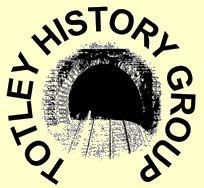Joseph Mountain & the Victoria Gardens
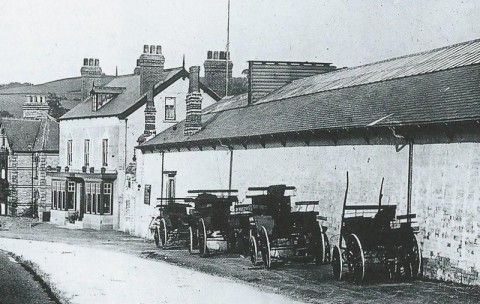
The Victoria Gardens and Joseph Mountain's house beyond
Joseph Mountain was born in Easingwold, North Yorkshire in 1833, the son of John and Ann Mountain. He was baptised there on 14 July 1833. John Mountain had died by 1837, leaving his wife to bring up three children in poverty. Ann is shown on the 1841 census as an agricultural labourer in Easingwold, together with Eliza, aged 11, Joseph aged 8 and William aged 5.
In 1851 Joseph was an apprentice plumber to John Daggett, living in nearby Boroughbridge. On 30 July 1855, Joseph married Elizabeth Martin in Sheffield. She appears to be the daughter of William Martin, an edge tool forger of Furnival Street. Joseph became an apprentice to Messrs. Pitt & Co., plumbers of Waingate and some years after set up business on his own account in the same street. A daughter, Emily Jane, was born in 1857.
His business prospered and by the time of the 1861 census he was employing one man and an apprentice. A second daughter, Clara, was born later the same year. Although the plumbing business remained in the Waingate, the Mountain family had moved to Grimesthorpe by 1864 where two sons were born, Joseph Samuel in 1865 and John Arthur in 1868. Joseph retained offices in Grimesthorpe at least until 1883, but a further move of home followed. In 1869 the family were living at The Grove, Millhouses.
In the 1871 census, Joseph is described as a plumber and glazier, and is living near Abbeydale works. The census entry for his household is between those for William Tyzack, landowner and steel manufacturer, and William Cooke, spring knife manufacturer. The census isn't specific on the address of the houses which are just described as "Abbey Dale" but newspaper advertisements for the Sheffield Borough Building Society show Joseph Mountain, a director, living at Mountville, Beauchief. A daughter, Florence was born in the summer of 1871.
At each of the places he lived, Joseph Mountain bought land and built extensively and for more than a decade he was very successful. At one point he was worth £50,000, a small fortune at the time. He became a prominent public servant firstly as a Guardian of the Poor, representing both Brightside and Sheffield. He was a leading figure in the Park District Liberal Party and entered Sheffield Town Council in 1873 representing Brightside Ward. He was re-elected in 1876 and was raised to the aldermanic bench in May 1879. He was also Chairman of the Highways Committee. Joseph Mountain was nominated by his friends for the Mayoralty in 1881 but failed to win the election by just three votes.

Town Hall, High Court and Crown Court, Waingate built in 1808, remodelled and extended in 1866 and in 1897; designed by Watson of Wakefield
In the census of that year, Joseph and his family were living at Silverdale House, Station Road, Dore (now 2 Dore Road); Joseph is described as an Alderman, and a retired plumber. But financial ruin was not far away. Had the value of his properties remained intact, he would have been in a position of affluence but, unfortunately, there was an enormous depreciation in the value of land and property in the Sheffield area, and Joseph Mountain was one of the chief sufferers. Land that had been bought with the intention of building villas was now unsuitable even for agriculture, new roads having been built. Joseph had large numbers of properties that were tenantless and which should have brought in an annual income of £2,000; instead he had to pay the mortgages on them from rents on other properties that were let.
He was part owner with Amos Moss of the Ferham estate, a 50 acre site in Rotherham. The estate had been purchased for £27,000 in 1873. £2,000 was paid cash, the rest was borrowed by way of a mortgage. At the time of purchase the speculation was considered likely to be a very advantageous one. Against Joseph's strongly expressed wishes, however, no steps were taken to utilise the estate when it was first purchased and soon afterwards a decline in local industries set in. The demand for building land in the locality collapsed and, with the death of Mr. Moss, the whole burden of responsibility for the estate rested with Joseph who was unable sustain losses of £3,000 a year. In August 1883, he filed his petition for bankruptcy, almost entirely resulting from his speculation on Ferham.
The first meeting of creditors took place on 14 September 1883 at the Bank street offices of his solicitor, and son-in-law, D. H. Porrett. David Hunton Porrett, the son of Alderman George Porrett J.P. of Scarborough, had married Joseph's eldest daughter Emily Jane at the Church of St John the Evangelist, Abbeydale (where Joseph was a churchwarden) on 16 July 1880. The Ferham estate was liquidated by arrangement. General sympathy was expressed for Joseph, who was deemed to be not negligent, who did not live extravagantly and who did not squandor creditors' money. Unusually for a first meeting, his discharge was unanimously granted. Having been forced to give up his position on the Town Council because of his financial troubles, Joseph was now free to return to work on what had become his latest business venture: the Victoria Pleasure Gardens in Totley.
The idea had been suggested to Joseph in 1882 of turning into pleasure gardens a building estate which had been practically unproductive, there being little demand for building land in that area. Joseph was anxious to do anything which would generate an income from the land and had tried to form a limited company but the applications for shares were insufficient and the scheme fell through. He was unwilling, however, to abandon the idea completely and set about converting the land into pleasure gardens himself. In this he was fortunate that the receiver, Joseph Hardy, kept the Totley gardens project quite separate from his other financial affairs. Hardy's thinking was that even if the gardens made a small loss to begin with, being only partly constructed, they could be sold as a going concern if needs be.
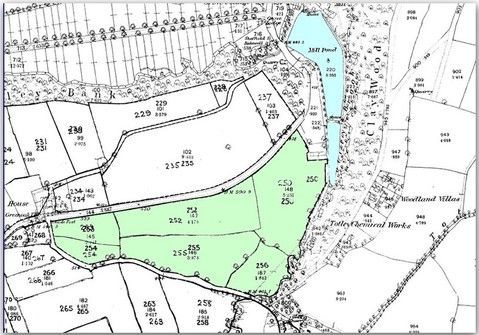
Map of Totley Rise showing the approx. location of the Victoria Gardens.
The Victoria Gardens occupied a triangular site of about 15 acres, bordered by to the north by Abbeydale Road (now Baslow Road), to the southwest by Mickley Lane, and to the east by Tyzack's Mill dam wall and the Totley Brook. They were built on what Joseph had called the Mountville Estate; the name is derived from that of his own house in Beauchief. Shares in the Mountville Freehold Land Society had been offered to subscribers in 1877 (also the date of our map, above) with a view to laying out the estate in lots varying from 600 to 1,200 yards each, to be paid for by monthly contributions extending over a period of 10 years. The scheme failed to attract support but at least seven new houses were built as these were offered for sale together with two older properties, fronting the turnpike road, which were used as a greengrocers shop and as a working men's club and reading room.
It is claimed that about 10,000 people attended the opening of the Victoria Gardens on Whit Monday, 22 May 1883. In addition to trees, shrubs, flowers and lawns, the gardens included a ballroom, a refreshment room 180 feet long and 60 feet wide, its roof and walls mostly built of glass, with a large billiard room adjoining, and a 400 yard long promenade with extensive views over the Derbyshire moors.
There were plans for more grandiose developments to rival Manchester's Belle Vue, opened in 1836. Grounds would be laid out for organised cricket, tennis, bowls and archery and later for cycle racing. A 5 acre boating lake would be provided with a subway connecting to the rest of the gardens (presumably this would be the old rolling mill pond which is about that size). A museum was to be built, and shooting galleries, and a monkey house. There were to be balloon ascents, pyrotechnic displays and all manner of entertainments.
Among the artists appearing on the first day were Joe Donaldson, the Metropolitan Star comic; Miss Maud Marion and Miss Florence Hall, serio-comic vocalists; Messrs Neal and Lawrence, "negro comedians and dancers"; Mons. Olvene, slack wire walker; and Messrs. Causton and Nuttall, clever gymnastic performers. There was a camera obscura, a large cage full of birds, and an exhibition of "things mysterious" entrance fee one penny. Because of bad weather, however, the explosives exhibition and a balloon ascent had to be cancelled. In the evening, Mr. Charles Harvey's String Band played in the pavilion for dancing and Mr. Frederick Charles Copley, of Sheffield, gave a fireworks display.
There was opposition to the pleasure gardens from the outset, from local people and even from some of Joseph's friends. But at first the gardens proved to be popular with the general public who could come out of town to Dore and Totley Station or, as was becoming increasingly popular, by bicycle en route for the Derbyshire countryside.
A major deficiency, however, was the lack of alcoholic refreshments, although at least four special licences were granted for one-off occasions. Joseph's application for a full drinks licence was refused at the annual meeting of the Eckington licensing division on 15 September 1884. The application was opposed by some local publicans, the Cherrytree Orphanage and landowners of the adjacent properties. Ebenezer Hall, of Abbeydale Hall, who was the owner of much of the nearby land, retired from the Bench lest his impartiality should be questioned, but his opposition was well known.
In spite of this setback the Victoria Gardens continued to flourish. In October 1884 some 800 workmen from Messrs. Walker & Hall of Sheffield were entertained there by J. E. Bingham, the Master Cutler. Facilities were steadily improving. There was accommodation for tennis, archery and cricket, and generally for recreation and a bicycle track had been laid down.
A second application was made at the following year's brewsters sessions, held at Dronfield on 14 September 1885, when Joseph sought to the provisional transfer of the existing drinks licence from the Cricket Inn, having already agreed to purchase it from its owners S. H. Ward & Co., brewers of Sheffield. Further new buildings were planned, fronting on to the Abbeydale Road [Baslow Road], so that customers could obtain a drink without paying admission to the gardens, except on gala days. The property would include a large entrance hall with bar, smoke room, billiard room, kitchen, six bedrooms and stabling for 20 horses. The magistrates again included Ebenezer Hall who stood aside only after it was said that there was written evidence that he would not "on any account" consent to the granting of the licence. Other opponents included Mr. Bown, innkeeper of the Cross Scythes, the Overseers of the Poor of Totley, the vicar of Abbeydale, John Hall of Abbeydale Hall and other local landowners. The application was refused on the grounds that there were already adequate facilities for the local population. No consideration was given to the special circumstances nor to the lack of any alternative between the Beauchief(f) Hotel and the Cross Scythes.
The Victoria Gardens continued to survive for a few more years with income from mid-week dances, finishing in time for the last train back to Sheffield, and the occasional Grand Ball in the pavilion, which was also hired out for private parties and dances. Busloads of children visited the monkey house but by 1887 the venture was beginning to fail.
In September 1887, it was announced that the Town Council proposed to convert the Victoria Gardens into a convalescent hospital for smallpox patients from Sheffield. Alderman Brooksbank had reached an agreement with the Victoria Gardens Company for the use of the land and buildings for six months as a temporary hospital for convalescent patients from the Borough Hospital. In speaking about the plan, Ald. Brooksbank referred to the epidemic of smallpox and pointed to the urgent need for increased hospital accommodation.

Licensed Victuallers Hall, Abbeydale Road, Dore; built in 1878-1879 for the Licensed Victuallers Association
A meeting of Dore and Totley residents was held at the Licensed Victuallers Hall, Abbeydale Road; a resolution passed to oppose the scheme; a deputation sent to the Council's solicitors which included Rev. Aldred; and a writ issued to restrain the Council from carrying out the conversion or the erection new buildings for the proposed hospital.
The injuction was refused and by 7 October 1887 detailed preparations had been made for the isolation and conversion of the pavilion. These included the erection of a double fence six feet high at some distance from the building; the cutting off of all drains and installation of dry charcoal closets; the fitting of hot water pipes around the building; a new ingenious ventilation system in the roof with gas jet sterilisation of escaping air; and internal reorganisation to provide living accommodation for the resident doctor, Dr. Pearson, working areas for three or four nurses and domestic staff and segregation of the sleeping quarters for men and women. The hospital could take thirty smallpox patients at any one time and would significantly reduce the pressure on the Borough Fever Hospital. The alterations were supervised by Messrs. Flockton and Gibbs, architects of many of Sheffield's finest public buildings.
Local fears, perhaps, had been misplaced as patients that were sent to the Victoria Gardens were those who had been assessed as being free from contagion. In the event, the hospital opened for nearly five months during which time none of its 488 patients died, nor was there any spread of infection to the surrounding district. The hospital closed on 29 February 1888, a new fever hospital having been opened at Lodge Moor a week earlier.
Bank Holidays had been very busy times for the gardens, but during Easter 1888 Victoria Gardens were still being thoroughly disinfected after the end of the hospital contract and the various premises were being cleaned, painted and decorated in readiness for re-opening. Joseph Mountain took the Corporation to court to recover £400 either as rent or as damages and was awarded a lesser sum. Local tradespeople who had stocked up for the usual crowds of pleasure seekers on their way to the gardens and to the Peak District were disappointed. With the gardens closed and cold weather, Dore and Totley were very quiet. But on 6 August, Bank Holiday Monday, the crowds returned and the local traders were hard pressed to meet their demands for provisions. Victoria Gardens were open with entry free of charge, except to the pavilion which was reserved for dancing. It was estimated that 3,000 people booked to travel by train to Dore and Totley and large crowds flocked into the gardens in the afternoon where there were shooting galleries, swingboats and other new attractions. Wet weather towards evening meant that many of the visitors paid the pavilion entrance fee.
A limited liability company was formed, the Sheffield Victoria Gardens Company (Limited), to run the business and Joseph's son, Joseph Samuel Mountain, became its on-site manager. Now it was the turn of young Joseph to attempt to obtain a drinks licence. At the annual brewster session at Eckington on 27 August 1888 application was made for a beer and wine licence only, spirits not being necessary as the prime need was for refreshment. Much the same arguments were presented as before and mention was also made of the change of ownership and the recent co-operation with the Corporation. It was estimated that between £400 and £500 had been spent on improvements to the gardens since the previous application in 1885. As before, the Bench observed that the local requirements were fully served by the existing licences. It was not necessary to establish another permanent drinking place for the needs of occasional visitors; occasional temporary licences would suffice. On hearing these words Joseph junior withdrew their third application.
Severe gales caused considerable damage to the perimeter fencing at Victoria Gardens at the beginning on February 1889 but they didn't prevent a full dress gala ball being held there on the 11th. The Bradway Brass Band played and the event was well attended. Easter was quieter than in earlier years but at times the roads were lined with visitors making their way to the gardens where the main attraction was a brass band contest organised by Mr. Charles Harvey. Total prize money was £24 with half of that going to the winners, the Wharncliffe Silkstone Band. Everything passed off orderly and successfully with very few casualties, it was observed, road accidents being commonplace in those days.
On 14 February 1889 Joseph Mountain wrote to the Editor of the Sheffield Daily Telegraph to comment on a piece written by its correspondent "Rambler". Joseph confirmed that he had agreed to rent part of his land at Totley for the construction of temporary accommodation for workmen (i.e. navvies building the Dore and Chinley Railway) and said this land was near to the Victoria Gardens which would continue to be used for the health and recreation of the people. Whether these constructions were wooden huts or brick-built properties we do not know but it is worth remembering that Dorothy A. Trott, in her autobiography "A Tapestry of Life" said that Bricky Row had been built to house the tunnel navvies and that the residents were promised that they would be demolished when no longer required.
On 8 June 1889 an advertisement appeared in the Sheffield Daily Telegraph announcing the sale by auction of the Victoria Gardens, all its buildings and fittings, and 10 further lots comprising adjacent and contiguous plots of land, some with buildings owned by the Mountain family, some without properties and others where there were ground rents generated from tenanted properties that were not owned by the family. We have not seen the associated plans but it would appear that these plots included most or all of the Totley Rise crescent of houses and shops (Bricky Row) since it contained no fewer than 26 adjoining properties including at least three shops, some said to be built of brick and almost all said to front on to Abbeydale Road.
The sale also included a lot with four houses fronting on to Mickley Lane (Brook Terrace?), a large detached house with outbuildings on Mickley Lane occupied by a Mr. Eaton; four pairs of semi-detached villas between the dam and a private road; and an empty corner plot of about half an acre between Abbeydale Road and this private road. This may have been the plot where the Vets now stands? This area is shown as unbuilt in the maps of 1877, 1899 and 1924 (last surveyed 1914-15). Yet Jo Rundle, in Totley Independent, December 2006, wrote that a row of cottages that stood here (presumably numbers 73, 75 and 77) was demolished around 1929 to be replaced by Jim Thompson's garage. We do not know whether any of the smaller lots were sold at the auction on 25 June 1889, but certainly the Victoria Gardens were not.
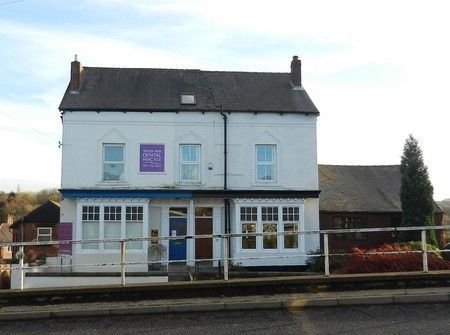
Joseph Mountain's house, 85-87 Baslow Road.
Joseph and Elizabeth Mountain had been living for some time in the detached house adjacent to the turnpike road frontage of the Victoria Gardens, at what is now called 85-87 Baslow Road. Joseph still had the appetite for a fourth attempt at obtaining a drinks licence and came up with a truly outrageous idea of how to obtain it. He converted his house into a hotel and made a deal with Mr. Ralph Armitage, of the Adelphi Hotel, Arundel Street, to run it. Armitage was to rent the place for £60 a year, payable quarterly, and the agreement was contingent upon his successful application for a drinks licence. He had no lease.
The application was duly heard at the Eckington Brewster Sessions on 1 September 1890 and resulted in comical exchanges between the Bench and Mr. Armitage's representative, Mr. Joseph Binney, long-suffering veteran of all four applications, when it was demonstrated that Mr. Mountain could, if he so wished, evict Mr. Armitage, demolish the fence between the hotel and the Victoria Gardens and thereby circumvent previous refusals by the Bench to grant it a licence. Application refused. Four days later an advertisement appeared in the properties-to-let pages of the Sheffield Daily Telegraph for the New Queen's Temperance Hotel - apply Joseph Mountain, Totley.
For the next couple of years, the Victoria Gardens carried on with a programme of entertainment that included a mixture of the tried and tested and the experimental. Brass band contests were particularly successful in drawing large attendances, especially during Easter, Whitsuntide and at August Bank Holiday. Despite modest prize money, they were taken very seriously indeed and the management of the gardens were to be congratulated for their efforts to promote fair contests with unbiased judging. The contest of 18 April 1892 was a case in point where 13 bands attended, the event being managed by Mr. Charles Harvey and judged by Mr. Henry Coward who shivered in his unheated tent for six and a half hours in freezing temperatures barely visible in the blizzard conditions to the majority of the audience. The contest was deservedly won by the Batley Old Band who received a first prize of £16.
Less successful, from the viewpoint of the promoters, were expensively backed attractions featuring Miss Maude Brooks of Liverpool. These involved a balloon ascent and parachute descent, whilst brass bands played for those outside and dance bands played in the pavilion. The balloon contained 26,000 cubic feet of gas and was engineered by Capt. Whelen of Huddersfield. It was capable of carrying only one person strapped below it in a harness, and the nineteen year old Miss Brooks was very slightly built. Thousands of pleasure-goers turned up to watch. The trouble was that the streetwise amongst them, and there were many, didn't pay to enter the Victoria Gardens but instead took up position outside. Some were close to the perimeter but others occupied the hillsides around Cherrytree Orphanage, St. George's Farm and even Mickley hamlet where they passed the 4½ hours it took to fill the balloon by consuming the contents of very large picnic baskets.
Eventually, Joseph Mountain, himself, escorted the brightly clad young lady to the balloon. On the occasion of 15 September 1890, Miss Brooks ascended to a height estimated at 4,000 feet (10,000-12,000 was normal), jumped, descended gracefully and landed in a field between the Victoria Gardens and Christ Church, with the balloon continuing some distance beyond Dore. On 1 August 1892, however, there was a strong wind. Miss Brooks landed uninjured in a field near Unstone and the balloon was eventually retrieved from Chaddesden, to the east of Derby.
Then on 6 October 1892 Elizabeth Mountain died suddenly at Victoria Gardens. She was 58 years old. Her funeral took place at Christ Church, Dore on 8 October. Her death affected Joseph greatly. Two or three weeks afterwards he suffered a stroke, and three months later a second one. He also suffered from heart disease and his health gradually deteriorated. In May 1893 he had a third stoke and never fully regained consciousness, dying some eight days later in the early hours of 23 May. He was aged 60. His medical adviser, Dr. Pearson, of Glossop Road, was in attendance. There was a very quiet funeral service conducted by Rev. J. T. F. Aldred and his body was interned in Dore Churchyard on 25 May.
The Victoria Gardens were offered at auction on 31 October 1893. The first lot included the nine acres of gardens, pavilion, dining-rooms etc. together with fixtures and fittings and the adjacent house/hotel. The principal inducement held out to prospective purchasers was the desirability of the site for building purposes. The lot realised £2,200. Other smaller lots were sold too. A plot of freehold land said to be opposite the post office, comprising about half an acre, went for £150. Another freehold house with outbuildings (possibly "Glover House" at the corner of Mickley lane and the track that was to become Glover road) went for £210 and a house and shop, with three adjoining houses "at Totley Rise" changed owners at £340.
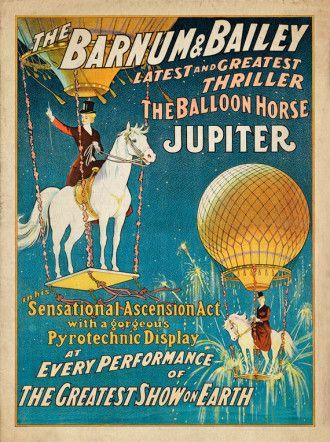
Jupiter appeared twice daily at the Victoria Gardens on the 14th and 15th of May 1894, the day the Totley Tunnel opened to passenger trains.
The new owners opened the Victoria Gardens briefly the following year with a two-day gala on Whit Monday, 14 May, and Tuesday 15 May 1894, the first day the Dore and Chinley Railway carried passenger traffic. The Midland Railway Company laid on special trains. The main attraction, engaged "at enormous expense" was the "World-famous aerial marvel, Jupiter". Jupiter was a beautiful horse that was raised from the ground by a balloon whilst being fired at with roman candles and other pyrotechnic paraphernalia.
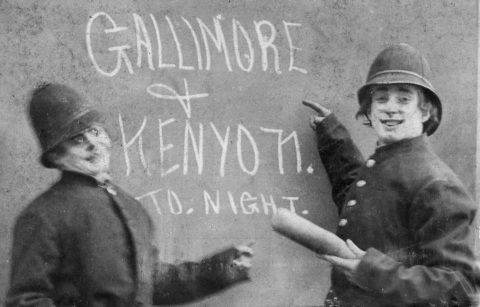
Other attractions included Misses Gallimore and Kenyon, Nubia and Black "negro eccentrics", Miss Maud Medley, Misses Sampson and De Mar, Miss Ella Rezine and W. H. Foster. The Trojan Athletes appeared in their unique performance on the Trojan Rotating Perch. Also at great cost the management hired the Venezia Troup of acrobats, who had appeared by Royal Command at Windsor Castle before the Queen. The Prince of Wales' Prize Brass Band and a string band played for dancing on the green and in the large pavilion. There was "accommodation for 10,000 persons come rain or shine" which was just as well as the weather was showery on both days. Entrance at 1 o'clock, price 6d. The event was reported to be the most successful ever held at the gardens.
By 3 November, it would appear that demolition of the buildings had begun as the sale of fixtures and fittings included 48 large glazed window panes, 20,000 bricks and the same number of slates.
To be concluded...
Totley History Group has been researching this area of the village for many years from its early days as farmland, through its various incarnations as the Mountville Estate (1877-1883), the Victoria Pleasure Gardens (1883-1894), the Michael Joseph Hunter years (1894-1906), James Gledhill's Rhubarb Triangle and Poultry Farm (1906-1931) and finally the Laverdene Estate (1931 to present day). As well as this article on Joseph Mountain and the Victoria Gardens, we have also published a short article on James Gledhill and released some documents relating to the Mountville Estate.

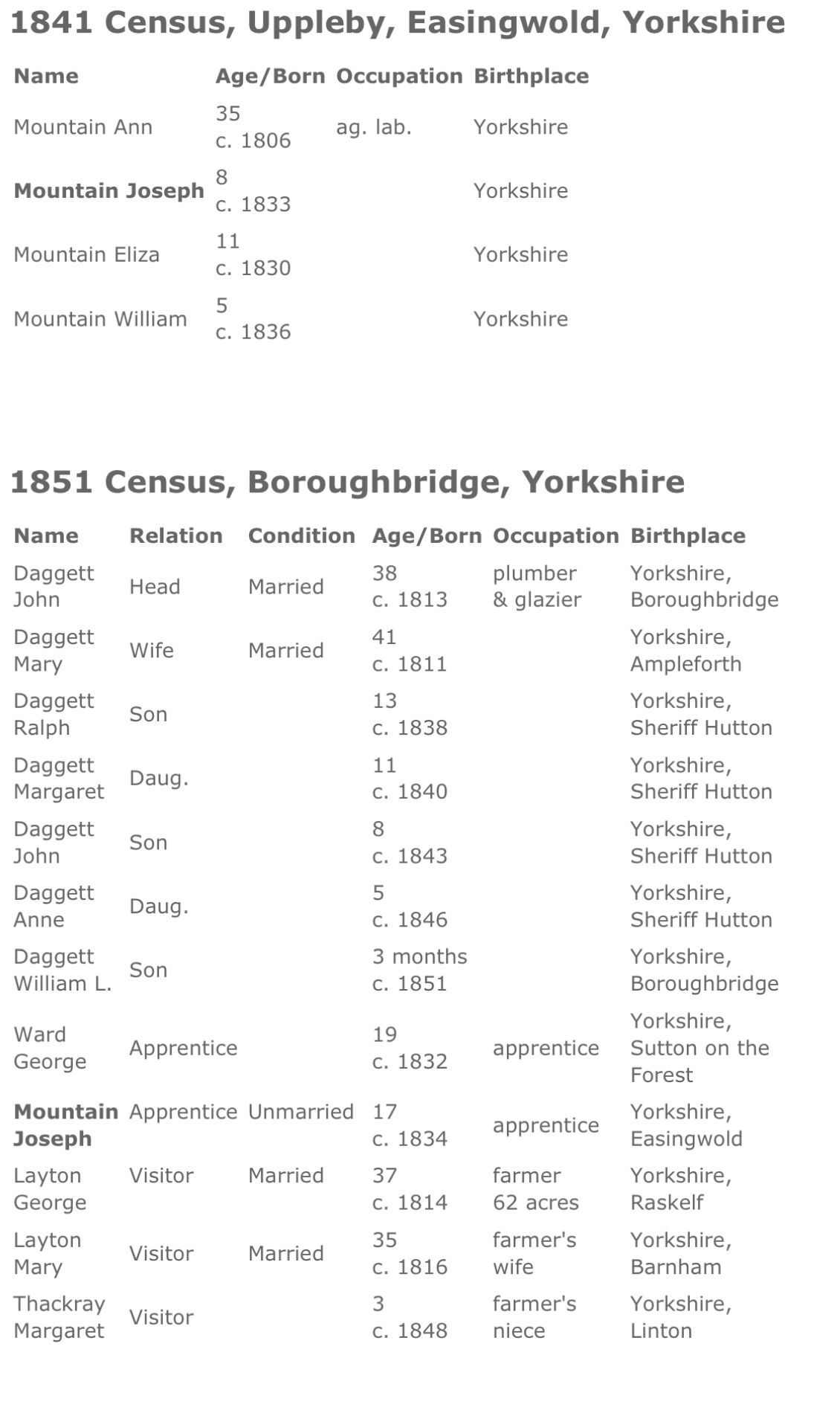
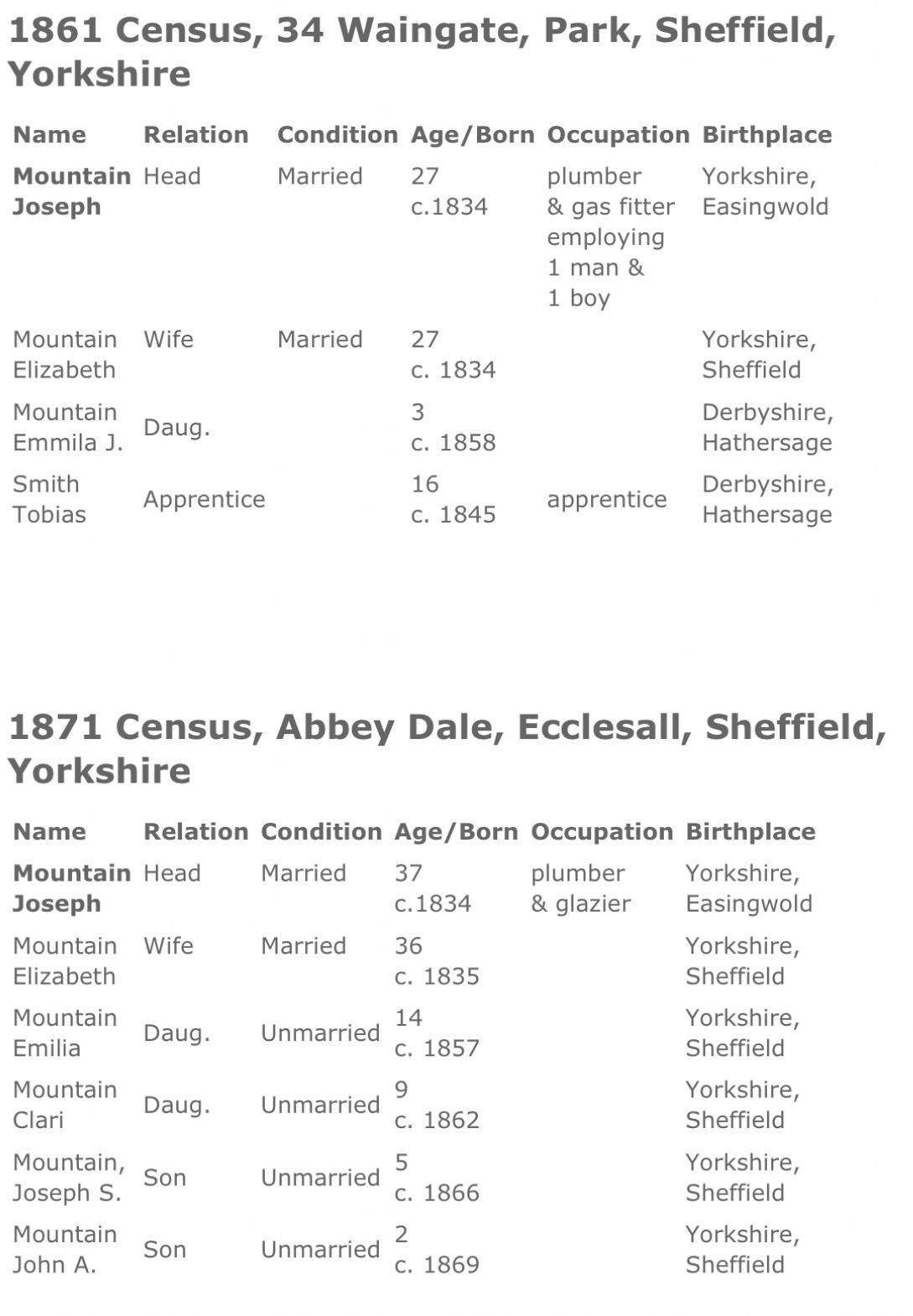


Joseph Mountain's gravestone, Dore Christ Church
The inscription reads:
In Loving Memory
of
ELIZABETH,
WIFE OF JOSEPH MOUNTAIN,
WHO DIED 6TH OCTOBER 1892
AGED 58 YEARS
ALSO OF THE ABOVE
JOSEPH MOUNTAIN,
WHO DIED 23RD MAY 1893 AGED 60 YEARS
ALSO OF CLARA; THEIR DAUGHTER,
WHO DIED JULY 22ND 1910
AGED 48 YEARS.

Joseph Mountain's daughter, Emily Jane and son-in-law David Hunton Porrett, Dore Christ Church
The inscription reads:
IN LOVING MEMORY OF
DAVID HUNTON,
SON OF
D. H. & E. J. PORRETT,
WHO DIED 3RD OCT. 1893,
AGED 7 MONTHS.
ALSO OF
DAVID HUNTON,
BELOVED HUSBAND OF
EMILY J. PORRETT,
WHO DIED 22ND SEP. 1918,
IN HIS 69TH YEAR.
ALSO OF THE ABOVE NAMED
EMILY J. PORRETT,
A DEVOTED WIFE AND MOTHER
WHO DIED FEB. 23RD 1942,
IN HER 85TH YEAR.
IN LOVING MEMORY OF
ANN HERBERT,
VERY DEAR SISTER OF ELIZABETH,
WHO DIED NOV. 23RD 1963, AGED 81 YEARS.
